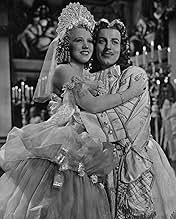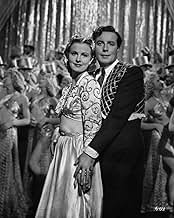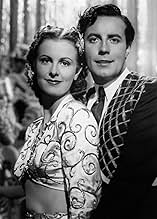Johannes Heesters(1903-2011)
- Actor
- Soundtrack
Growing up as the youngest of four sons of the merchant Jacobus Heesters and his wife Gertruida, née van der Hoevel, he began a commercial apprenticeship after finishing school. He actually wanted to become a priest, but then began an apprenticeship in a bank. In 1920 he switched to acting. He initially completed singing and acting training in Amsterdam and had his first theater engagements there in 1921. He later also played on stages in The Hague, Brussels and Rotterdam. In 1924 he received a supporting role in his first silent film "Cirque Hollandais" directed by Theo Frenkel. In 1930 Heesters married Louisa H. Ghijs, with whom he had two daughters, Wiesje and Nicole. He was married to his wife for 53 years until her death in 1985. After appearances at theaters in the Netherlands, Belgium and Switzerland, he received his first engagement as a tenor in operetta in 1934 in Millöcker's "The Begging Student" at the Vienna Volksoper. A year later, in 1936, he went to Berlin.
Here Heesters celebrated his breakthrough, first at the Komische Oper and then at the Metropoltheater and the Admiralspalast. He also owed his nickname "Jopie" to the audience in the German capital. He was immediately discovered for the film. Numerous UFA productions followed, such as his first leading role in "The Bettelstudent" (1936) and "The Court Concert" (1936). With "Gasparone" (1937) alongside Marika Rökk, Heesters became a film star. In 1938 he sang the role of Count Danilo for the first time in the Franz Léhar operetta "The Merry Widow", a role that he developed into one of his signature roles for 35 years. This was followed by "The Adventure Continues - Every Woman Has a Sweet Secret", "My Aunt - Your Aunt" (1939) and "Love School" (1940). The Reich Ministry for Public Enlightenment and Propaganda soon included him on the so-called "God-Given List". His attitude towards Nazi Germany was contradictory. Although he owed his success primarily to the UFA, he also rejected German citizenship. He neither became a member of the NSDAP nor did he explicitly distance himself from National Socialism.
Despite a few encounters with Adolf Hitler, he performed in the Netherlands in 1938 with a Jewish theater group that had fled Germany. There was massive criticism from abroad, especially in Holland, where he was accused of being a collaborator who was in German service when his homeland was occupied by the Wehrmacht. He celebrated great successes during the war years with films such as "Hello Janine" with Marika Rökk, "It began so harmlessly" with Theo Lingen and "Roses in Tirol" with Hans Moser. Despite his success in film, Heesters returned to theater after the Second World War. His popularity remained unbroken. Count Danilo's entrance song "I'm going to Maxim" from the operetta "The Merry Widow" became an evergreen. He appeared on stage in this role over 1,600 times. In 1953, Otto Preminger hired him for the Hollywood film "The Virgin on the Roof". Meanwhile, Heesters had already been involved in around 50 film productions by 1961. In 1970, after a long break from filming, he appeared in "The Inspector: Parking Lot Hyenas". "The Beautiful Wilhelmine" followed in 1983.
In 1984 Johannes Heesters became an honorary member of the Vienna Volksoper. In 1985 the comedy film "Otto - The Film" followed. Heesters was also active in literature. He described his life in his 1993 autobiography entitled "Thank God I'm Not Young Anymore." In the 1990s he appeared in front of the camera for the television plays "Two Munichers in Hamburg", "Two Old Hands" and "Between Night and Day". In 1992 Heesters married the actress Simone Rethel, who was 46 years his junior. From 1996 to the summer of 2001 he played alongside his wife in the play "A Blessed Age" written for him by Curth Flatow. In 1999 he was awarded a "Bambi" for his life's work. In 1997, at the age of 94, Heesters celebrated his 75th stage anniversary and went on tour with the play "A Blessed Age". At the turn of the millennium, Heesters, who was fond of tobacco and whiskey until old age, became the oldest active entertainer in the world. In 2001 he was honored with the Platinum Romy for his life's work.
In 2002, the 99-year-old Heesters was able to look back on 80 years on the stage. Another autobiographical work by Heesters followed in 2002 with the title "Even a hundred years are not enough". In 2003, Johannes Heesters received an honorary award from the "Bambi" for his life's work. In 2004, Heesters appeared four times in the role of the gentleman in Hofmannsthal's "Everyman". At the Wittenberge Elbland Festival he was awarded the title of "chamber singer". In August 2006, the first exhibition about Heesters took place in the Berlin Academy of Arts, which he personally opened with a song recital. In the year 2006 he received the "Honorary Radio Rainbow Award". In 2008, Heesters took on a supporting role in the Til Schweiger comedy "1 1/2 Knights - In Search of the Adorable Herzelinde". From July 2010, Heesters plays the king in Rolf Hochhuth's "Inselkomödie" in the Berliner Ensemble.
Johannes Heesters died on December 24, 2011 in Starnberg, at the age of 108.
Here Heesters celebrated his breakthrough, first at the Komische Oper and then at the Metropoltheater and the Admiralspalast. He also owed his nickname "Jopie" to the audience in the German capital. He was immediately discovered for the film. Numerous UFA productions followed, such as his first leading role in "The Bettelstudent" (1936) and "The Court Concert" (1936). With "Gasparone" (1937) alongside Marika Rökk, Heesters became a film star. In 1938 he sang the role of Count Danilo for the first time in the Franz Léhar operetta "The Merry Widow", a role that he developed into one of his signature roles for 35 years. This was followed by "The Adventure Continues - Every Woman Has a Sweet Secret", "My Aunt - Your Aunt" (1939) and "Love School" (1940). The Reich Ministry for Public Enlightenment and Propaganda soon included him on the so-called "God-Given List". His attitude towards Nazi Germany was contradictory. Although he owed his success primarily to the UFA, he also rejected German citizenship. He neither became a member of the NSDAP nor did he explicitly distance himself from National Socialism.
Despite a few encounters with Adolf Hitler, he performed in the Netherlands in 1938 with a Jewish theater group that had fled Germany. There was massive criticism from abroad, especially in Holland, where he was accused of being a collaborator who was in German service when his homeland was occupied by the Wehrmacht. He celebrated great successes during the war years with films such as "Hello Janine" with Marika Rökk, "It began so harmlessly" with Theo Lingen and "Roses in Tirol" with Hans Moser. Despite his success in film, Heesters returned to theater after the Second World War. His popularity remained unbroken. Count Danilo's entrance song "I'm going to Maxim" from the operetta "The Merry Widow" became an evergreen. He appeared on stage in this role over 1,600 times. In 1953, Otto Preminger hired him for the Hollywood film "The Virgin on the Roof". Meanwhile, Heesters had already been involved in around 50 film productions by 1961. In 1970, after a long break from filming, he appeared in "The Inspector: Parking Lot Hyenas". "The Beautiful Wilhelmine" followed in 1983.
In 1984 Johannes Heesters became an honorary member of the Vienna Volksoper. In 1985 the comedy film "Otto - The Film" followed. Heesters was also active in literature. He described his life in his 1993 autobiography entitled "Thank God I'm Not Young Anymore." In the 1990s he appeared in front of the camera for the television plays "Two Munichers in Hamburg", "Two Old Hands" and "Between Night and Day". In 1992 Heesters married the actress Simone Rethel, who was 46 years his junior. From 1996 to the summer of 2001 he played alongside his wife in the play "A Blessed Age" written for him by Curth Flatow. In 1999 he was awarded a "Bambi" for his life's work. In 1997, at the age of 94, Heesters celebrated his 75th stage anniversary and went on tour with the play "A Blessed Age". At the turn of the millennium, Heesters, who was fond of tobacco and whiskey until old age, became the oldest active entertainer in the world. In 2001 he was honored with the Platinum Romy for his life's work.
In 2002, the 99-year-old Heesters was able to look back on 80 years on the stage. Another autobiographical work by Heesters followed in 2002 with the title "Even a hundred years are not enough". In 2003, Johannes Heesters received an honorary award from the "Bambi" for his life's work. In 2004, Heesters appeared four times in the role of the gentleman in Hofmannsthal's "Everyman". At the Wittenberge Elbland Festival he was awarded the title of "chamber singer". In August 2006, the first exhibition about Heesters took place in the Berlin Academy of Arts, which he personally opened with a song recital. In the year 2006 he received the "Honorary Radio Rainbow Award". In 2008, Heesters took on a supporting role in the Til Schweiger comedy "1 1/2 Knights - In Search of the Adorable Herzelinde". From July 2010, Heesters plays the king in Rolf Hochhuth's "Inselkomödie" in the Berliner Ensemble.
Johannes Heesters died on December 24, 2011 in Starnberg, at the age of 108.






























